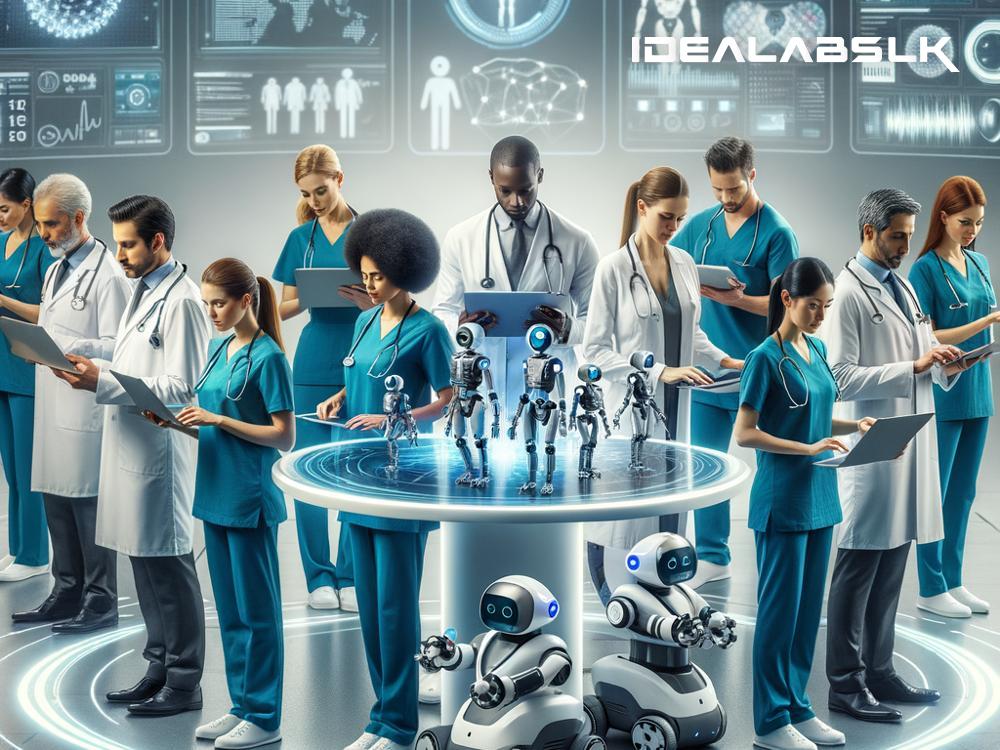Title: How AI is Revolutionizing Hospital Operations: Boosting Efficiency & Making Healthcare Smoother
In today's rapidly advancing world, where technology touches almost every aspect of our lives, Artificial Intelligence (AI) stands out for its incredible potential to transform industries. One such sector where AI is making significant strides is healthcare, particularly in optimizing hospital operations. The integration of AI in hospitals is not only streamlining healthcare delivery but also enhancing efficiency significantly. Let's dive into how this groundbreaking technology is reshaping the way hospitals function and the positive impacts it brings to both patients and healthcare professionals.
Simplifying Patient Care and Management
One of the core ways AI is optimizing hospital operations is through improving patient care management. AI systems can quickly analyze vast amounts of patient data, including medical histories, diagnostic information, and treatment plans, to assist doctors in making informed decisions faster. This use of AI helps in diagnosing diseases more accurately and suggesting personalized treatment plans, ensuring each patient receives the best possible care.
Moreover, AI-powered chatbots and virtual health assistants are becoming a patient's first point of contact in many hospitals. They can handle inquiries, schedule appointments, and even provide basic medical consultation after hours, reducing waiting times and freeing up medical staff to focus on more critical tasks.
Streamlining Administrative Tasks
Hospital administration involves a plethora of paperwork and manual tasks, from managing patient records to processing insurance claims. AI is stepping in to automate these mundane yet critical operations, leading to a significant reduction in paperwork and administrative burden. AI algorithms can quickly sift through documents, extract necessary information, and organize data efficiently, leading to faster processing times and fewer human errors.
This optimization isn't just about cutting down on paper. By automating these tasks, hospitals can redirect their resources and staff towards providing better patient care and improving overall service delivery.
Enhancing Diagnostic Accuracy
One of the paramount concerns in healthcare is the accuracy of diagnoses. AI, with its ability to learn and analyze patterns in massive datasets, is proving to be a game-changer in this area. AI systems are being deployed to assist in interpreting X-rays, MRIs, and other imaging tests, often catching details that may be missed by the human eye.
This precision not only aids in early detection of diseases such as cancer but also ensures that patients get appropriate treatment promptly. The result? Better outcomes and a higher chance of recovery for patients.
Predictive Analytics for Preventative Care
Imagine if hospitals could predict outbreaks or identify patients at risk of certain conditions before they become serious. Well, with AI, this is becoming increasingly possible. Through predictive analytics, AI can examine trends and patterns in healthcare data, helping predict potential health issues before they arise.
This capability not only helps in preventive care planning but also enables hospitals to manage their resources effectively, ensuring that they are prepared for any upsurge in patient numbers, whether due to seasonal illnesses or unexpected outbreaks.
Improving Patient Flow and Resource Allocation
Hospitals are often bustling places where managing patient flow and ensuring optimal use of resources can be quite challenging. AI is making strides in this area by optimizing patient admissions, bed allocations, and surgery schedules. Intelligent algorithms can forecast peak times, anticipate the need for certain services, and allocate resources accordingly to minimize wait times and improve patient experience.
Furthermore, AI can help manage inventory, from medicines to surgical tools, ensuring that the right supplies are available when needed without excessive stockpiling, thus saving costs and space.
The Road Ahead
The integration of AI in hospital operations is a testament to how technology can enhance and streamline healthcare delivery. From improving patient care and administrative efficiency to ensuring better diagnostics and preventive care, AI is undeniably paving the way for a more efficient, responsive, and patient-focused healthcare system.
However, the journey doesn't stop here. As AI technology continues to evolve, its potential to transform healthcare further is immense. Continuous innovation, coupled with ethical considerations and robust data protection measures, will be key to leveraging AI's full potential in optimizing hospital operations and uplifting the overall quality of healthcare.
Conclusion
In essence, AI is revolutionizing hospital operations by making healthcare delivery more efficient, accurate, and patient-friendly. It's an exciting time for healthcare technology, and as we move forward, the promise of AI holds the potential to not only improve hospital operations but also significantly enhance patient outcomes and satisfaction. The future of healthcare is here, and it's powered by AI, making it clearer, smarter, and more efficient for all.

